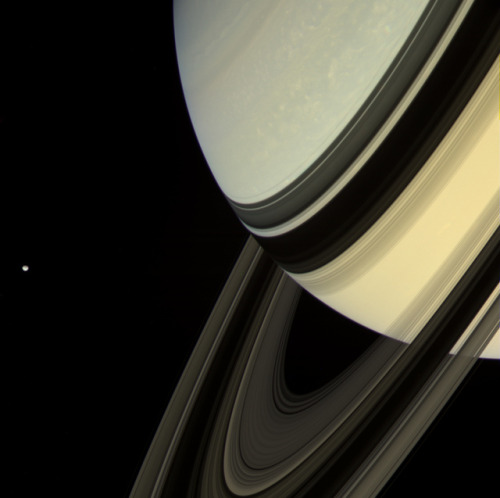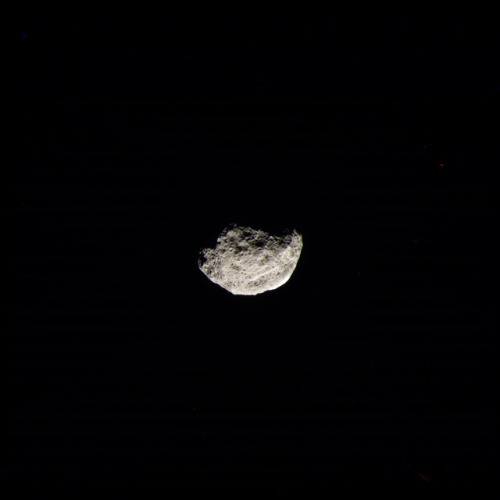Ten Interesting Facts About Saturn
Ten interesting facts about Saturn
Saturn is sometimes called “The Jewel of the Solar System.” It is a planet that is nothing like our own. Humans have been gazing up at Saturn for a long time. They have been wondering about it for thousands of years.
Here are some fun facts about the Ringed Planet.

Saturn is huge. It is the second largest planet in our Solar System. Jupiter is the only planet that is bigger.

The rings are huge but thin. The main rings could almost go from Earth to the moon. Yet, they are less than a kilometer thick.

Four spacecraft have visited Saturn: Pioneer 11, Voyager 1 and 2, and the Cassini-Huygens mission have all studied the planet.

Saturn has oval-shaped storms similar to Jupiter’s: The region around its north pole has a hexagonal-shaped pattern of clouds. Scientists think this may be a wave pattern in the upper clouds. The planet also has a vortex over its south pole that resembles a hurricane-like storm.

Saturn is made mostly of hydrogen and helium: It exists in layers that get denser farther into the planet. Eventually, deep inside, the hydrogen becomes metallic. At the core lies a hot interior. (click the image for a better resolution).

Saturn has 62 moons: Some of these are large, like Titan, the second largest moon in the Solar System. But most are tiny – just a few km across, and they have no official names. In fact, the last few were discovered by NASA’s Cassini orbiter just a few years ago. More will probably be discovered in the coming years.

Saturn orbits the Sun once every 29.4 Earth years: Its slow movement against the backdrop of stars earned it the nickname of “Lubadsagush” from the ancient Assyrians. The name means “oldest of the old”.

In Saturn there is aurora: Photographic composition made by the Hubble Space Telescope showing the occurrence of aurora in the southern hemisphere of Saturn at intervals of two days.The aurora is visible only in the ultraviolet.

Saturn spins on its axis very fast. A day on Saturn is 10 hours and 14 minutes.

You can see Saturn with your own eyes: Saturn appears as one of the 5 planets visible with the unaided eye. If Saturn is in the sky at night, you can head outside and see it. To see the rings and the ball of the planet itself, you’ll want to peer through a telescope. But you can amaze your friends and family by pointing out that bright star in the sky, and let them know they’re looking at Saturn.
sources: nasa.gov, universetoday.com and solarsystem.nasa.gov
More Posts from Sharkspaceengine and Others
If the earth had rings, would we see them when it was night? It's a stupid question but still
Yes, just as the moon reflects the light of the Sun, the rings also reflect. But perhaps they would not be like the rings of Saturn, they would be smaller because the Earth has the gravity smaller than the one of Saturn to hold them and also they would not be made of ice, because they would be closer to the Sun. There is a specific point in the System Solar known as “ice line” or “snow line”. This is the point in the Solar System, where ice deposits could have survived for long periods of time. Any closer and the radiation from the Sun sublimates the ice away. Instead, the rings could be made of rock and dust.










My first posts will be from systems located within the Triangulum Galaxy. The above 3 images were taken from Space Engine of the galaxy. The background galaxy in the images is Andromeda.
For those of you that are not familiar with the Triangulum Galaxy, it is the third largest member of the local group, sometimes considered a satellite galaxy of Andromeda. The galaxy is also known as M33, NGC 598 or the Pinwheel Galaxy. Approximately 40 billion stars reside within this spiral galaxy. It is believed that the galaxy lacks a central supermassive black hole and central halo.
Wikipedia link below.
Triangulum Galaxy
Not space related, but wanted to see what my space engine followers thought of this question. Hoping to get some good memes out of it.
Shark Question
Are male sharks now going to be banned if their claspers are visible? Also are female sharks with scars on their face going to be banned since that can be considered sexual abuse by a male shark?

Picture of the Day 2 - November 13, 2018
A ringed desert world located in the core of the Large Magellanic Cloud Galaxy. There are nearly 116 stars within just 1 light year of this planet.










Saturn, rings and moons
NASA/JPL-Caltech/SSI/Kevin M. Gill

Picture of the Day - January 10, 2019
An ocean world with a small ring system hangs over the sky of a barren moon.




Oculus System - Post 2 (Inner-most Planet)
The inner-most planet is a Chthonian Planet, or the core remnant of a large Ice of Gas Giant that lost its atmosphere to the solar winds. The planet is a Super-Earth mass world of 8.4 Earth Masses and a radius of 1.56 Earth’s or 9,954 kilometers in radius. The planet is extremely dense, being made almost entirely out of compressed metals with a thin silicate crust. It has an average density of 12.1 g/cm³. The surface experiences a gravitational force of 3.44 g.
This world has a water-vapor atmosphere that generates a powerful greenhouse effect on the surface. Surface temperatures reach 1,623 °F, and sodium and potassium clouds circle the planet. Pressure on the surface is so extreme, the atmosphere exists as a super-critical fluid, with an atmospheric pressure 6,511 times that of Earth. The atmosphere reflects enough sunlight that the day-side has a bright-white color that drowns out the glowing clouds.
High Resolution Pictures
Picture 1 - Inner-Hell
Picture 2 - Tiny Moon
Picture 3 - Glowing Storms
Picture 4 - Steamy Atmosphere






Pictures of the day - December 22, 2018
Insight System - Sixth Planet (Insight A-VI)
Insight A-Vi is an Earth-like water-world with a surface completely covered in oceans. The planet has a mass of 0.65 Earths and a diameter 0.97 times that of our planet. An extensive ring system surrounds the planet and the oceans contain simple signed-celled life.
The planet orbits at an average distance of 1.10 AU and a day on the surface lasts 18 hours and 31 minutes. Compared to the inner-worlds, Insight A-VI is rather cold with an average global temperature of 41 F. Still the oceans absorb enough heat that there are no ice caps at the poles, since ocean currents keep the water from freezing.
Note the inner two planets have comet like appearance from their atmospheres being strip away by the sun.
High Resolution Pictures
Insight A-VI
Three small moons
Rings
The sun and inner planets
Sunset
Planet rise
-
 noura-099 liked this · 2 months ago
noura-099 liked this · 2 months ago -
 trashkyo liked this · 3 months ago
trashkyo liked this · 3 months ago -
 merridelicious reblogged this · 3 months ago
merridelicious reblogged this · 3 months ago -
 merridelicious liked this · 3 months ago
merridelicious liked this · 3 months ago -
 ganzneu liked this · 6 months ago
ganzneu liked this · 6 months ago -
 darffy liked this · 1 year ago
darffy liked this · 1 year ago -
 darkwindows24 liked this · 1 year ago
darkwindows24 liked this · 1 year ago -
 threshpontiac reblogged this · 2 years ago
threshpontiac reblogged this · 2 years ago -
 elusiveladydjinn liked this · 2 years ago
elusiveladydjinn liked this · 2 years ago -
 dont-call-me-cliff liked this · 2 years ago
dont-call-me-cliff liked this · 2 years ago -
 cem-aranci liked this · 2 years ago
cem-aranci liked this · 2 years ago -
 annoyinglyshinycherryblossom liked this · 2 years ago
annoyinglyshinycherryblossom liked this · 2 years ago -
 simurguvercinka liked this · 2 years ago
simurguvercinka liked this · 2 years ago -
 louise3426 liked this · 2 years ago
louise3426 liked this · 2 years ago -
 luzazuladah liked this · 2 years ago
luzazuladah liked this · 2 years ago -
 iwillruletheuniverse reblogged this · 2 years ago
iwillruletheuniverse reblogged this · 2 years ago -
 8nijelakobubamarcu9 liked this · 2 years ago
8nijelakobubamarcu9 liked this · 2 years ago -
 89845aaa liked this · 2 years ago
89845aaa liked this · 2 years ago -
 ava1enzue1a reblogged this · 2 years ago
ava1enzue1a reblogged this · 2 years ago -
 ava1enzue1a liked this · 2 years ago
ava1enzue1a liked this · 2 years ago -
 qwanblog liked this · 2 years ago
qwanblog liked this · 2 years ago -
 lautaro12 liked this · 2 years ago
lautaro12 liked this · 2 years ago -
 aadyeah liked this · 3 years ago
aadyeah liked this · 3 years ago -
 m-o-p-e reblogged this · 3 years ago
m-o-p-e reblogged this · 3 years ago -
 lazytimemachinelight liked this · 3 years ago
lazytimemachinelight liked this · 3 years ago -
 arialis reblogged this · 3 years ago
arialis reblogged this · 3 years ago -
 saimas19 liked this · 4 years ago
saimas19 liked this · 4 years ago -
 ridingthewave33 liked this · 4 years ago
ridingthewave33 liked this · 4 years ago -
 veryinappropriate reblogged this · 4 years ago
veryinappropriate reblogged this · 4 years ago -
 fixinmyhijaab liked this · 4 years ago
fixinmyhijaab liked this · 4 years ago -
 sakkjhhii liked this · 4 years ago
sakkjhhii liked this · 4 years ago -
 iwillruletheuniverse reblogged this · 4 years ago
iwillruletheuniverse reblogged this · 4 years ago -
 tessceleste reblogged this · 4 years ago
tessceleste reblogged this · 4 years ago -
 mrmarttmar liked this · 4 years ago
mrmarttmar liked this · 4 years ago
My Space Engine Adventures, also any space related topic or news. www.spaceengine.org to download space engine. The game is free by the way. Please feel free to ask me anything, provide suggestions on systems to visit or post any space related topic.Check out my other blog https://bunsandsharks.tumblr.com for rabbit and shark blog.
294 posts
![Purple Matter [500 X 750] By Skratt](https://64.media.tumblr.com/51a0374610bfbc488c77e06e4caa581f/tumblr_pfo1ajoUYD1wf4hhqo1_500.jpg)
